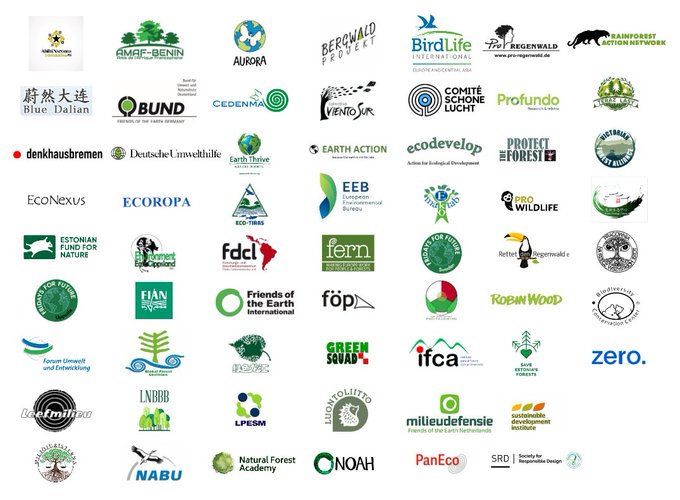70 ühenduse pöördumine: biomajandus toob kaasa ökosüsteemide edasise ekspluateerimise

NGOs raise concerns: Bioeconomy leads to further ecosystem exploitation
The term „bioeconomy“ is intended to sound green and natural, a refreshing alternative to the fossil economy. But a closer look at current discussions around this political term reveals that the bioeconomy has the potential to further erode human and social rights and aggravate environmental destruction. Forests and other ecosystems are already being overexploited for paper and packaging, bioenergy and more.
We have surpassed what can be sustainably supplied and so moving from fossil to bio sources without embedding it in a wider socio-ecological transformation and drastically reducing consumption would be a disaster. We, the undersigned associations and organisations, have therefore come together to call on the European Union (EU) and the national governments of its members to end the waste economy and to design European land use policies that protect people, nature and our climate.
Europe is banking on the promises of the bioeconomy. In recent years, several European countries have adopted their own bioeconomy strategies, and the EU released its updated strategy in 2018 with the title „A Sustainable and Circular Bioeconomy“. The bioeconomy is also explicitly referenced in the European Green Deal. In all of these strategies, the idea is to develop an economy based on biological resources. The focus is on replacing fossil fuels with biomass rather than on changing the prevailing wasteful energy- and resource intensive economic model.
The strategies ignore the fact that increasing demand for biomass would pose an additional threat to global ecosystems and the people who depend on them. Even today, the ecosystems from which these resources would come are dramatically overused, as planetary boundaries are being exceeded.
The economy of the future must be environmentally responsible and socially just
For the bioeconomy not to be a destructive force, the focus on such strategies needs to be fundamentally changed – it must break free from the compulsion of growth, accept ecological and planetary boundaries, promote sufficiency, and aim to build a fair society. Only by significantly reducing extraction and resource consumption, in all sectors of the economy, can we meet the demand for biological resources without further harming biodiversity and the climate.
Land is limited
Intact natural ecosystems such as forests and wetlands are essential carbon stores for climate protection as well as habitats for the preservation of biodiversity. Meeting climate and biodiversity goals will therefore require conserving and sustainably managing a much larger portion of land. With the European Green Deal and the European Biodiversity Strategy, the EU has set a goal of protecting 30 percent of its land and marine areas and promoting ecosystem restoration.
This reduces the already limited land for biomass production and increases competition for land from food and feed production, recreation, infrastructure, and urban development. Limited land cannot be allocated multiple times, so it must be used in the most socially just way. Any bioeconomy strategy would need to include aims to alleviate the pressure on land use, such as by significantly reducing consumption of animal products and, thereby, the cultivation of animal feed.
Biomass imports from the Global South are not a solution
Imports of biomass from the Global South are a cornerstone of raw material supply in many bioeconomy scenarios, but this is highly problematic and unfair. Industrial agriculture and forestry are already displacing and exploiting people in the affected countries, as well as destroying natural habitats. A dramatic increase in biomass demand would exacerbate these problems. We therefore need effective measures to reduce resource consumption as well as mandatory ecological and social standards.
Long-term material over energy use: Stop the waste!
Because biomass is a limited resource, and intensive land use has harmful consequences for both humans and nature, it is essential to follow the cascading use principle: Prioritise long-term material uses over short lived disposable products, and only use biogenic resources for energy at the end of its life cycle. Creating energy from biomass, such as in biogas plants, for biofuels or wood burning, is an environmentally damaging waste of valuable resources. Countries and the EU need to remove incentives for wood burning and to introduce policies to reduce single-use packaging and implement reusable systems.
Waste and residual resources are already being used
It is clear that fields, forests, and seas cannot supply enough resources for a bioeconomy at today’s consumption levels, so some strategies consider also using waste and residual materials – but these are already a scarce commodity subject to vigorous competition. In agriculture, „residual materials“ like straw are widely used. In fact, they are considered a useful resource.
In truly sustainable forestry, „forest residues“ would be left in the forest as they are a key part of the ecological cycle. As such, material defined as waste or residual can provide only limited amounts of raw material for the bioeconomy.
Community participation is essential
To ensure broad societal participation in the implementation of the bioeconomy, engaging civil society and citizens on an equal footing is essential. They need to much more than before help identify conflicting goals, and to be asked to help design an economy built with the interests of future generations at its heart. European governments and EU institutions should establish suitable procedures and allocate adequate resources to ensure this happens.
Vaata allakirjutanud ühendusi